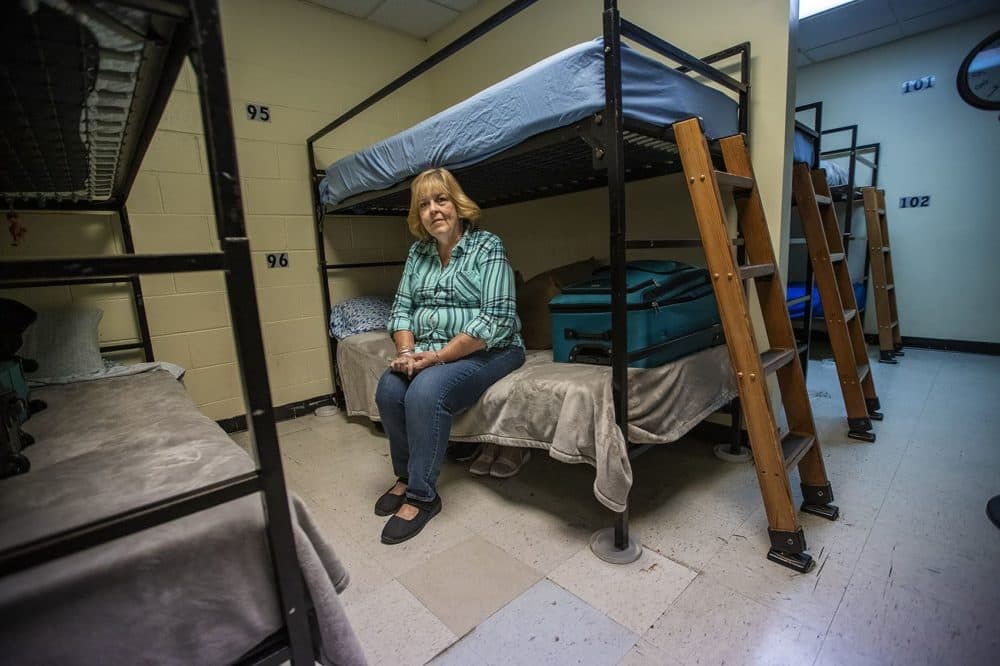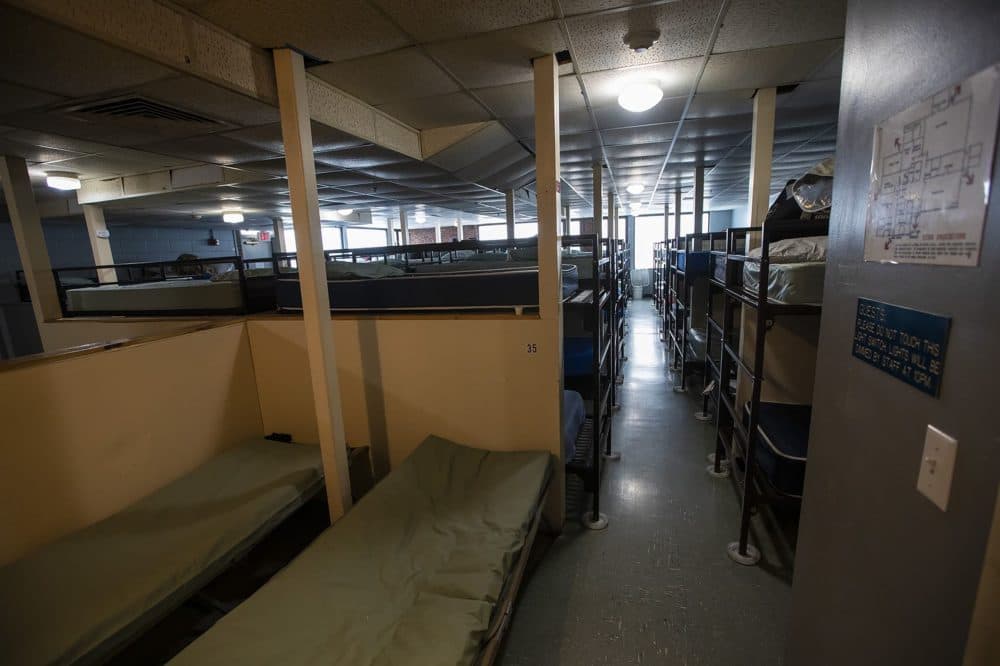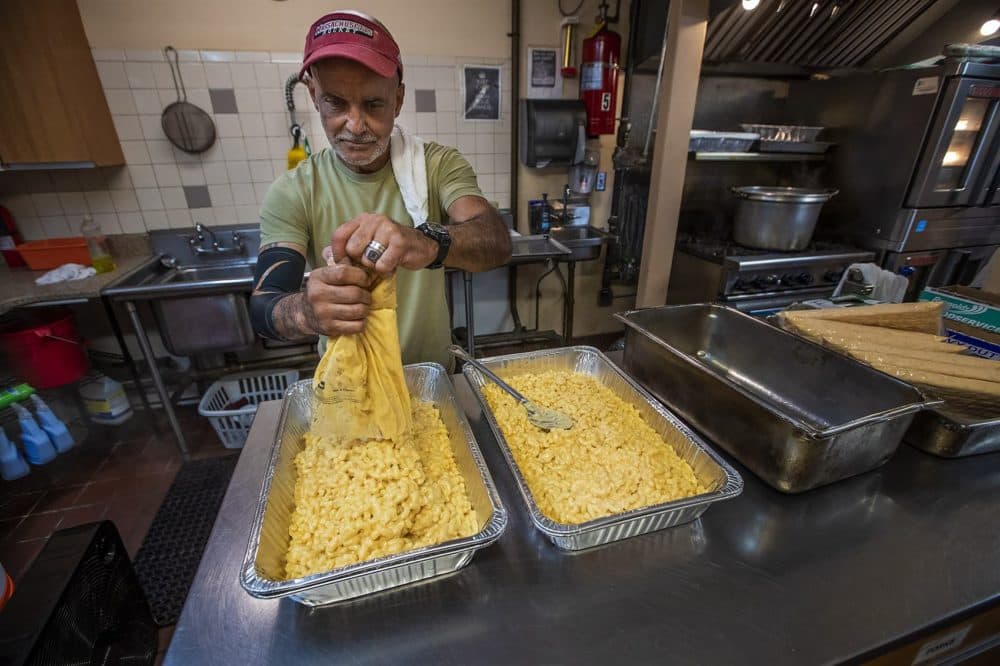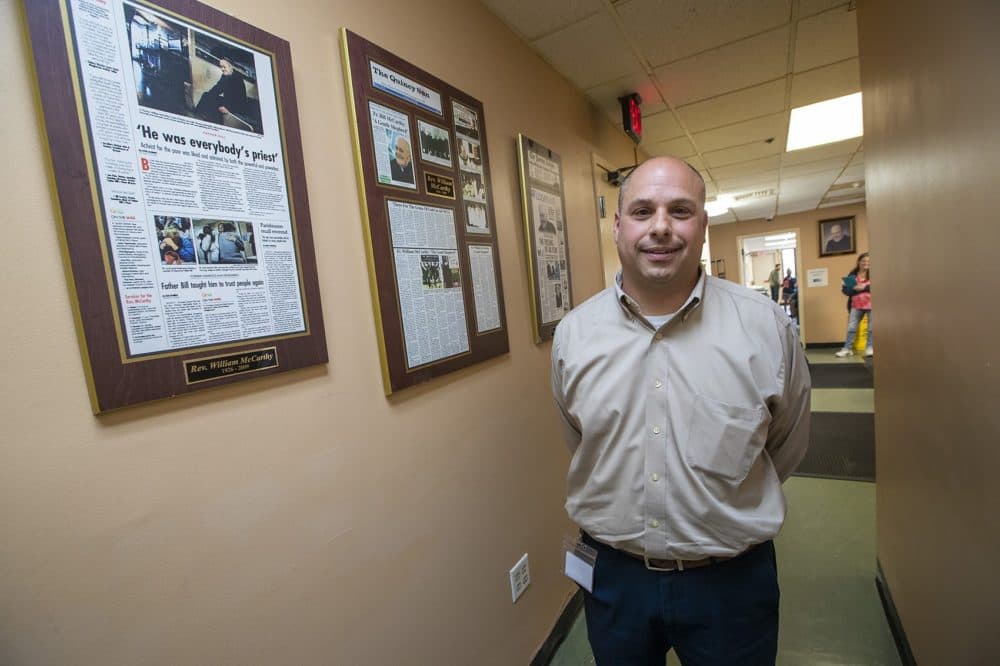Advertisement
Overwhelmed Mass. Homeless Shelters Call For New Vision, Funding From State
Part three of a four-part series. Here are parts one and two.
Sixty-two-year-old Chris Sheehan points out her bed at Father Bill's Place, the emergency homeless shelter in Quincy, and refers to it as her home. Right now it's the only space that is anything close to her own.
"I have very big bags," Sheehan says, pointing to the suitcases carrying her belongings. "I have a lot of clothes, which a lot of people aren't as fortunate to have the same thing."
Sheehan has been staying at Father Bill's for a year. She became homeless after a series of events with her job and family. She's hoping to revive her career in human services. But even if she does, she can't afford the rent on most apartments.
"Housing's really an issue on the South Shore for a lot of working professionals," says the Marshfield native. "Economically, it's just really difficult to get first, last and security all together. ... It's stressful. I'm not going to lie. It's stressful."

But there's one thing Sheehan doesn't have to worry about. Her bed at the shelter is reserved for her every night.
Father Bill's & MainSpring President and CEO John Yazwinski says the shelter's 24 women's beds are always full.
"We're averaging, you know, anywhere from 35 to 40 women a night," Yazwinski says. "So we're putting them in one of our conference rooms to sleep on the floor."
A couple of dozen men sleep on overflow mats in the cafeteria, because all 65 of the men's beds are taken every night.
Father Bill's — and its sister facility in Brockton, MainSpring House — are what's known as low-threshold shelters. They take pretty much anyone, including people who are intoxicated and those with criminal records. They don't perform criminal background or sex offender registry checks.
Many shelters in Massachusetts have stricter rules. According to information provided by the Massachusetts Department of Housing and Community Development, 21 of the 39 emergency adult homeless shelters funded by the state require sobriety.
Advertisement
That's one reason people come to Father Bill's & MainSpring from all over the place.
In the last fiscal year, 21% of people who arrived at the shelters came from outside the programs' service area, which covers 41 South Shore cities and towns.
Father Bill's & MainSpring tries to get those people back to where they're from within three days — with a place to stay.
Yazwinski says he doesn't have the funds to keep sheltering everyone who comes looking for help.
"Right now we're getting, per bed, about $29 a bed. And it's costing us around $42 per bed per day," he explains.

The $29 per bed daily rate from the state Department of Housing and Community Development is meant to cover 126 beds, according to Yazwinski.
But Father Bill's & MainSpring has 210 beds and serves about 260 people every night.
"So the state's paying less than half of the need that comes in," Yazwinski says. "And that's pretty consistent across the commonwealth when we've looked at the data, is that the state is paying for maybe about 50% of the need for homeless individuals across the commonwealth."
Approximately 18,000 people are homeless in Massachusetts. A third of them are individual, or "unaccompanied," adults. Most of those adults are staying in shelters, as Massachusetts shelters a higher percentage of its residents who are homeless than most other states. Beyond the state funding, adult shelters get most of the rest of their money from the federal government, donations and grants.
Debate Around More State Help
Adult homeless shelters started springing up around Massachusetts about 40 years ago. Each one negotiated its own contract with the state. The reimbursement rates among shelters vary to this day.
The piecemeal approach has resulted in shelters with different rules and levels of service. And that contributes to people leaving the area where they lived when they became homeless in order to find a shelter bed.
Joe Finn, executive director of the advocacy and policy organization Massachusetts Housing and Shelter Alliance, says there isn't a clear-cut way for everyone to enter a shelter near them and get a bed.
"Oftentimes there's some deal of confusion about entry points and where people can actually walk in and access resources or services," Finn says. "We need to be able to have some type of systemic approach around entry points across the state."
The shelter system for homeless families is much more standardized.
Massachusetts has a "right to shelter" law for families with children and pregnant women.
The system is fully funded and managed by the state. And families can apply for shelter at offices around Massachusetts, or by phone.

Some homeless service providers wonder if the state should do more to help coordinate the adult shelter system.
The executive director of the state Interagency Council on Housing and Homelessness, Linn Torto, says officials are listening to providers' concerns.
"There may be providers who may feel that they're underfunded, and they do need more money. I totally get that," she says. "Totally understand that."
But, she adds, more state involvement in the individual adult shelter system could have undesired results: shelters losing some control.
"I do think that one of the features of the individual [adult shelter] system is its ability to be nimble and flexible," Torto explains. "Because only 40-60% of the budget is state-funded, they are able to do some things that the family shelter system can't do because it's exclusively state funded."
'Managing Homelessness' And 'Not Ending It'
The state is assessing shelter capacity, according to Torto. The goal is to make sure every region has enough low-threshold beds — the ones people with active addiction and criminal records can access.
Torto says the interagency council is also working to improve discharge protocols for people coming out of state prisons and mental health programs, as well as private psychiatric hospitals that contract with the state. Right now some people get discharged with inadequate support plans and end up immediately homeless.
And state officials are launching a new system to collect data on people using the shelter system. That will allow them to identify trends in homelessness, and it'll help providers coordinate care for homeless adults who move from region to region.
But some advocates say the state needs to re-envision the mission of adult homeless shelters. And that means setting reimbursement rates that cover all of the different kinds of services a shelter should be offering.
"What we're doing is we're managing homelessness, and we're not ending it. It's just 'please, just get everybody indoors,' which is great. But we're struggling to keep up with that demand," says Yazwinski. "What we need is a triage rate, where we're going to not focus just about giving somebody a bed tonight. But the resources are going to be all about getting somebody out of here — to be able to do assessments, to rapidly re-house people."

The state has allocated $10 million over the last two years for rapid re-housing. That's a program that gives short-term rental assistance to get people out of homelessness quickly.
But even if shelters get more comprehensive resources, advocates say, there aren't enough places for people to go after shelter.
"I would love to see a system where we could immediately process and triage someone and place them in housing," says Finn, from the housing and shelter alliance. "The unfortunate truth is that there's insufficient housing opportunities at this point to do that. So even as effective as some of our housing programs are — programs that are serving this population — all of them are stretched in terms of housing people in a timely fashion."
Those programs are part of a model known as Housing First. The goal is to quickly place people in housing at the same time as providing support services to help them address the issues that led to their homelessness; those include addiction and employment struggles. It's the opposite of the old approach of making people solve their problems before getting housed.
Lyndia Downie is president and executive director of Pine Street Inn in Boston, which provides emergency shelter and permanent supportive housing for adults. She says housing is one of many issues the state, municipalities and homeless services providers need to address together.
"This is a big, big conversation that we need to have broadly, frankly, about all the pieces that we need regionally," Downie says. "And then I think there's the question of, even if there were resources available, do communities want to do this? And are they willing to step up and think about supportive housing, think about shelter differently?"
Advocates hope that conversation leads to a shelter system people anywhere in the state can easily access, to then find a path to a permanent home.
This segment aired on February 7, 2020.
